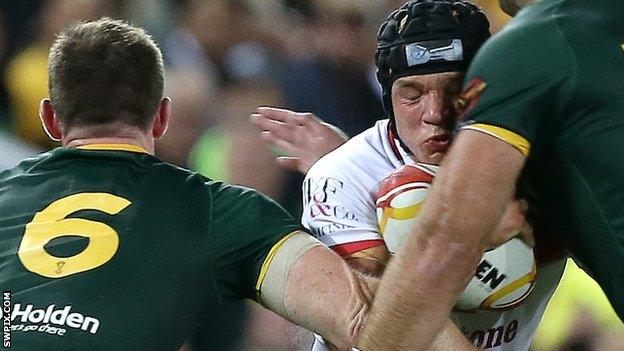Jonny Lomax: St Helens and England playmaker on his journey from A-Z - adversity to 'Zen'
- Published

Jonny Lomax finally achieved his aim of winning a Grand Final with Saints in 2019, and added another in 2020
There is a serenity to England and St Helens playmaker Jonny Lomax, a sense of calm and composure.
At 30 years old, he is now one of the senior players, one of the key performers, at both club and international level, and a two-time Grand Final winner.
He has a family, a wife and child with the close-knit support of his parents - Alison and Ian - and his sister.
Understandably, given the journey the Saint has been on during his career, suffering injuries that threatened not just his livelihood but his life, it has taken strength of character to get from A to Z. From adversity to Zen.
"Resilience and adversity has motivated me to appreciate the good times more," Lomax told BBC Radio 5 Live's Rugby League podcast, in conversation with former team-mate Jon Wilkin.
"It's human nature to want more, but sometimes being able to reflect [is important] - for me winning Super League for the first time in 2019 was a great moment to sit back and reflect on how good that was from where I'd been."
That Zen-like temperament has been far from easy to achieve - because adversity is something Lomax has faced multiple times in painful and mentally challenging circumstances.
Right back to the beginning
The rugby-mad Billinge lad, who would go on to play in a World Cup final and hoist silverware aloft, nearly did not get his chance.
Life took a dramatic turn when aged only 14, he suffered an accident in a game that could have had horrendous consequences.
Following a clash of heads, Lomax had to undergo emergency brain surgery after an extradural haemorrhage caused by fracturing his skull.
"In my career I've had extreme highs and extreme lows," Lomax added. "The funny thing is that being 14, I didn't really understand everything about it, I didn't really know everything behind it until recently from speaking to my family and looking back over my career."
Nine hours of surgery, the possibility that he would not make it through and the fear of ongoing issues around quality of life were all things that affected the family as much as - if not more than - the individual.
It was a delayed reaction that led to Lomax being admitted to hospital, a moment of panic that would remain with any parent.
"I did it five days before I was rushed in, eventually I had a burning sensation in my head and a feeling of cramp that I just couldn't make go away," he recalled
"My eyes were starting to close, and I put my head under a cold tap, and eventually didn't want to stand up so I put a cold towel on my head.
"Eventually my mum and dad came running up, thankfully my mum was on to the fact I was having a bleed and rang an ambulance. I passed out and my dad carried me downstairs.
"My last little bit of fight was spewing up in the ambulance and then I was put to sleep, and it was back-and-forth between what had been going on five days after the injury.
"I wake up after the surgery, but it was my mum, dad, sister and family who were the ones suffering."
The curse of the ACL - rehab, restart, repeat

Lomax (right of photo) joined in celebrations in 2014, but an ACL injury robbed him of a Grand Final spot
All the fortitude built up by his teenage obstacles, which included 12 months out of the game, would prove invaluable to Lomax in the coming years.
The dreaded ACL tear or rupture - the anterior cruciate ligament in the knee - is one of the most feared by all athletes. In years gone by it was enough to end a career. Now, with a huge amount of mental and physical effort and the skill of a surgeon, it can be overcome.
Lomax faced this hurdle three times - first as an academy player, then once he was established in the first team, forcing him to miss the 2014 Grand Final, and then again shortly after when he re-ruptured it.
He battled it all. The initial pain, the surgery, post-operation infection, drips, antibiotics, re-rupturing. It was not until the third time that he contemplated packing it all in.
"I got the phone call from the physio Nathan Mill and he confirmed it. I just hung up on him," Lomax said. "Straight away I broke down in tears.
"My mum and dad rushed around me and it was the first time I'd said 'I'm not doing that again, I can't go through it - I'm quitting'."
The delay while the injury calms down enough to allow for surgery gives every player time to get their head around their future options.
"My initial thought was that it's not for me," he said. "My dad said 'If you want to quit, you can'. I think it was the first time he'd have ever accepted a bit of what I'd call 'weakness' from me, really.
"The pain of the injury is generally the easiest bit to deal with, compared to the mental side - the repercussions of it are the most difficult and the ups and downs on the journey."
Thankfully for England and Saints, he carried on. Back-to-back titles and recognition as an athlete have made it all worthwhile.
World Cup dreams endure as home tournament nears

Lomax played in England's 2017 World Cup final loss to Australia
The most recent World Cup in Australia was a bittersweet experience for England, as Wayne Bennett's side enjoyed a superb tournament in reaching the final before losing to the hosts in Brisbane.
Lomax was a key component in such company, and with four more years under his belt as a player, there is hope that the 2021 showpiece - on home soil - can be the best yet.
"You get to challenge yourself against the best people in the world," he said.
"You want to be involved in those big games, they're the reasons you get involved, the games you remember as a supporter.
"Any chance to represent your country is fantastic, the World Cup on home soil is fantastic - I massively enjoyed going to Australia in 2017."
When coach Shaun Wane looks for character in his squad for this year's tournament, he will not need to look beyond Lomax for real determination, grit and that ability to bounce back from adversity.